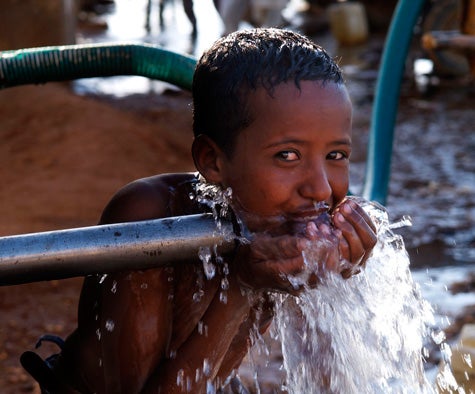
As we commemorate World Water Day on March 22, 2013, it is sobering that NASA’s Curiosity rover found convincing evidence that at one time Mars, like Earth today, was awash with water.
Curiosity’s trips have allowed scientists to peer into the past. Roughly three billion years ago Mars’ environment changed, the planet reportedly cooled and water froze or evaporated into space, leaving Mars desolate, cold and dry.
Today, the converse of that scenario – heat, brought on by a changing climate – is happening, and a drier, hotter and more parched Earth could well be our future unless we fundamentally change the way in which we manage the planet’s most precious resource: water.
Water and Cities
Africa is the world’s fastest urbanizing region, growing at of 3.9 percent per year. Lagos is set to overtake Cairo as Africa’s most populous city. Today about 320 million Africans live in urban areas, with water service coverage at less than 50% in most cities, leaving a majority of city dwellers to get water from unreliable sources. A path-breaking World Bank study “The Future of Water in African Cities: Why waste water,” argues that the pragmatic concept of Integrated Urban Water Management (IUWM) is a powerful tool that can help provide clean safe water to urban communities across Africa.
Water and Energy
Africa’s water resources are also used for hydropower generation which could make a lasting dent on energy poverty that leaves only one in three Africans with access to energy.
Africa’s hydropower resources are geographically concentrated. Hydropower from Cameroon, Democratic Republic of Congo, Ethiopia, Guinea and Zambia – the so-called Water Towers of Africa – could produce large-scale electricity at about one-third of the cost of thermal generation. This would be clean power and deliver cheap electricity to power homes, clinics, schools, hospitals, and businesses.
It is for this reason that the World Bank is making a major push on transformational projects such as Lom Pangar in Cameroon and the Kandadji Program in Niger to boost hydropower generation and invest in power pools in Africa to connect homes and businesses to affordable, reliable, clean energy.
Water, Food and Environment
Africa is water rich, yet its abundant patrimony of water resources has barely been tapped.
A new report predicts that Africa’s food and beverage markets could grow to top one trillion dollars in value in 2030. Predictable access to water is needed to respond to rising demand. More irrigation, particularly in Africa’s dryland areas, would allow farmers to grow high-value crops, increase food trade within Africa and beyond, boost incomes and eliminate hunger in communities while competing successfully in global markets.
Only 9 million of the 200 million hectares currently cultivated in Africa are irrigated. In contrast to Africa’s 4.5 percent, 44 percent of Asia’s cultivated land is irrigated. Climate smart agriculture offers promise for increasing farm productivity in an environmentally and socially sustainable way.
Water and Cooperation
Africa is home to 60 trans-boundary rivers, with many countries sharing the same basin. International river basins cover more than 60 percent of the continent, and virtually all the region’s mighty rivers cross several borders: the Nile crosses ten, the Niger nine, the Senegal four and the Zambezi eight.
To tackle the challenges posed by this political and geographic legacy, in 2011 a new long-term program – Cooperation in International Waters in Africa, CIWA – was launched to take a new, fresh approach that responds to the requirements of organizations engaged in international waters, and shares latest knowledge on best practices in promoting collaboration and development. CIWA programs place emphasis on the lessons learned from past involvement, including from Latin America and South Asia.
Back to the Future
Looking ahead, we can do much to galvanize action in the water sector by strengthening international collaboration, the theme of World Water Day 2013.
Climate change poses one of the biggest threats to the water sector. In his foreword to “Turn Down the Heat: Why a 4 degree warmer world must be avoided,” World Bank Group President Jim Yong Kim warned that “…lack of action on climate change not only risks putting prosperity out of reach of millions of people in the developing world, it threatens to roll back decades of sustainable development.”
Water is the basis of life. Let’s use it wisely.


Join the Conversation